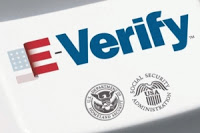 |
| Wikipedia |
John Whitehead
Desoto Times Tribune
As technology grows more sophisticated and the American government and its corporate allies further refine their methods of keeping tabs on citizens, those of us who treasure privacy increasingly find ourselves engaged in a struggle to maintain our freedoms in the midst of the modern surveillance state.
The latest attack on our right to anonymity and privacy comes stealthily packaged in the form of so-called job protection legislation. Introduced by House Judiciary Committee Chairman Lamar Smith (R-Texas) in June 2011, H.R. 2885 (formerly H.R. 2164), the “Legal Workforce Act,” is being marketed as a way to fight illegal immigration and “open up millions of jobs for unemployed Americans and legal immigrants.” However, this proposed federal law is really little more than a Trojan horse, a backdoor attempt by the powers-that-be to inflict a de facto National ID card on the American people.
Created under the auspices of securing the borders and preventing illegal immigrants from being hired for “American” jobs, E-Verify challenges the rights of the individual, the rights of labor and the rights of industry. As such, this is not a left or right issue. Anyone who values civil liberties should be alarmed. In fact, E-Verify is being opposed by various civil liberties groups such as the ACLU, American Library Association, The Rutherford Institute, Liberty Coalition and others.
If approved by Congress, this legislation would make the federal government the final authority on who gets hired by American businesses and in the process create a bureaucratic nightmare for already over-burdened and over-regulated small business owners. In a nutshell, H.R. 2885 requires all employers to submit potential employees’ names, Social Security numbers and other data to the Department of Homeland Security (DHS) for authorization before the employees can start work. The data would then be run through E-Verify, a government-run database and employment identification verification system.
In other words, the E-Verify system would require all those wanting to be employed by American companies to register the credentials of their citizenship in a government database. What this means, of course, is that in order to be able to verify an applicant’s legitimacy, the government would first have to build a massive database to store the biographical information of the entire working population in the United States—a huge undertaking with numerous pitfalls and security flaws, as we have seen with many other government databases. If you think unemployment is a problem now, just wait until your employment hinges on getting government clearance. Under this legislation, if a worker’s information is incorrect in E-Verify, he or she can’t work until the problem is resolved.
linkwithin_text=’Related Articles:’


Be the first to comment on "E-Verify: De Facto national ID and the end of privacy"